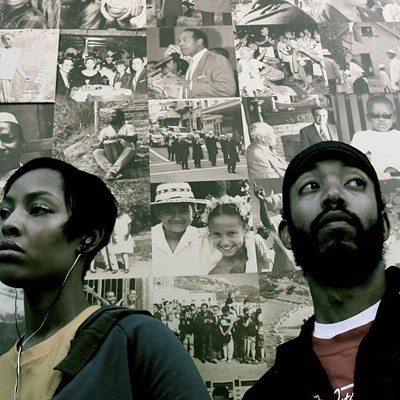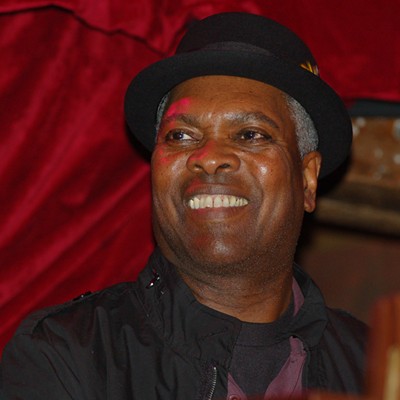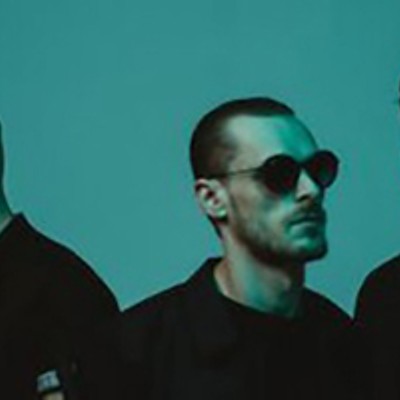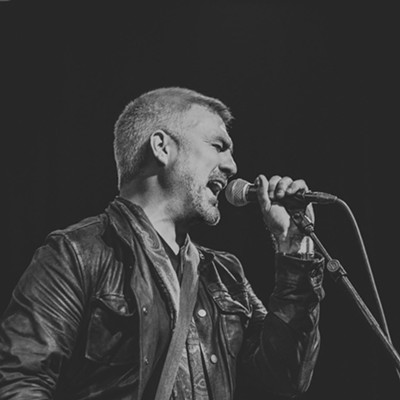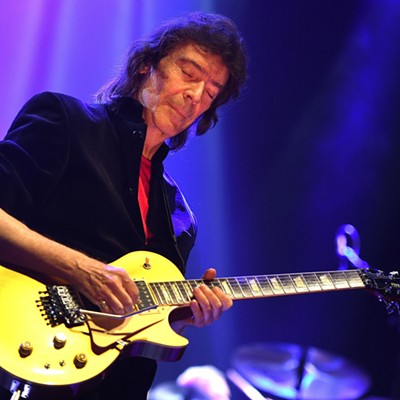But what Bigham wants most is to be respected as a singer-songwriter.
"Since I've been in L.A., I've always been working at composing and being a songwriter more than anything else. I just happen to play the guitar," Bigham said on the phone from his home in Los Angeles last week.
"Somehow, someone was always coming around, asking to me play with them, but I wrote songs (of) my own."
Thus in the late 1990s was born his project The Soul of John Black, which in its current incarnation is a blues-soul-rock power trio--including bassist Kwan Hearns and drummer Kerim Imes--that will visit Tucson for a gig Friday, May 18, at Plush.
The Soul of John Black began as a collaboration between Bigham and producer-about-town Chris "CT" Thomas. They released one album together in 2003, and it was highly praised for its combination of funky psychedelia and soulful folk and rock.
Now, Bigham is on the verge of releasing the follow-up, The Good Girl Blues, on the independent Yellowdog Records. It will hit the streets June 5.
The new CD is mostly a Bigham affair--he wrote all the tunes, produced and recorded the CD, sang and played all guitars and drums. Thomas, who was busy with other projects, played bass on just two tracks.
The Good Girl Blues finds Bigham at a crossroads, one at which smooth soul, swamp blues and hip-hop beats meld, the resulting sound at once sublime and raw, modern and somehow ancient, haunting and transcendent. The album is destined to cause a stir and likely to end up on many critics' best-of-the-year lists.
As a youngster growing up in Chicago, Bigham became so enamored of jazz session guitarists such as Larry Carlton, Lee Ritenour, Paul Jackson Jr. and Larry Coryell that he was inspired to pick up the instrument at age 13.
"My love for the guitar grew out of listening to those guys. I loved the idea of being like one of those session guys out here in L.A. I was kind of listening to Sly Stone and Hendrix, because my brother had that stuff, and I was kind of lost in Jeff Beck; but to me, the epitome of the guitar was Pat Metheny. I also really dug John Scofield."
But Bigham eventually realized his talents were elsewhere. "If it was gonna be that way, it would have been that way. I wasn't feeling it. I guess I just didn't want to practice hard enough to be like those guys. I wanted to grow in different directions than that."
When he was a teenager, Bigham's family relocated to Atlanta, where he began to embrace the life of the musician full-time.
"That's where I fell hard into the real band thing. There were bands everywhere. I and my cousin were in a dance band. We played everywhere in the South, and I was still in high school."
After a stint in the U.S. Air Force, Bigham moved to Los Angeles in search of work in the music scene.
He was still in his 20s when Miles Davis hired him based on a four-track demo tape. Bigham played percussion on Davis' final studio album, Amandla, to which he contributed the song "Jilli." He also appeared on the 1989 live album and DVD Miles in Paris.
Above all, under the great jazz trumpeter's brief tutelage, Bigham learned "the most important thing is to be myself."
Bigham explains: "I think the people that Mr. Davis chose to work with over the years, he might have heard something promising in them, but what they have is raw talent, and he helped them to develop ideas of their own. The person I was, was ambitious and absolutely bursting out, and I just needed an outlet."
Already pals with Fishbone drummer Philip "Fish" Fisher, Bigham was hired to play guitar and keyboards in that band in 1989. Fishbone essentially wanted Bigham to be himself as well.
"They said to me, 'Hey man, just add your flavor.'
"Honestly, I didn't think they needed me. They'd been together for like 10 years already, but they made me a full partner in the band, with one-seventh voting rights, for what that was worth. But I learned everything from making T-shirts to setting up a tour to recording in the studio. I wouldn't be doing my own recording projects now if not for the experience I got in that band."

